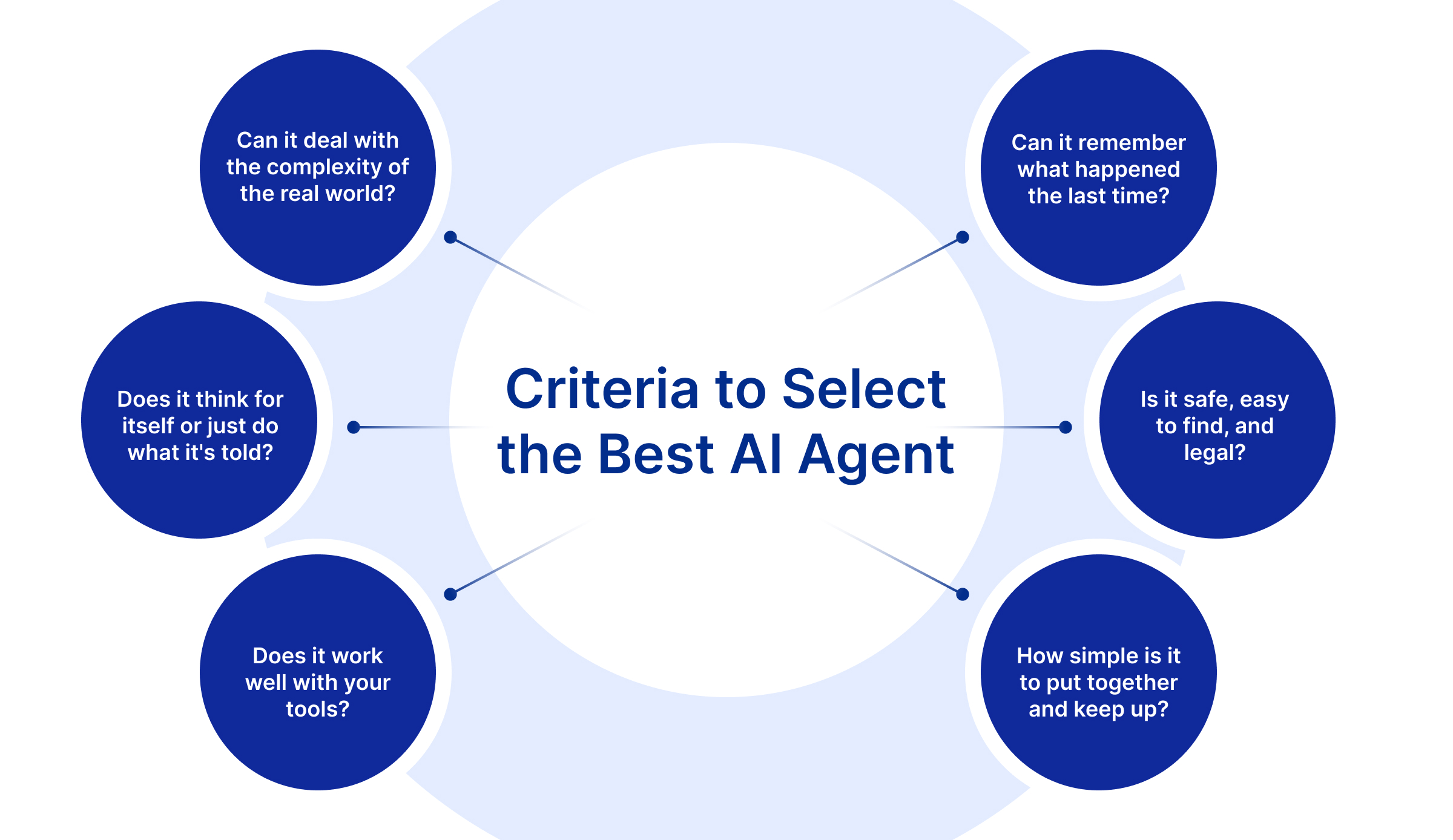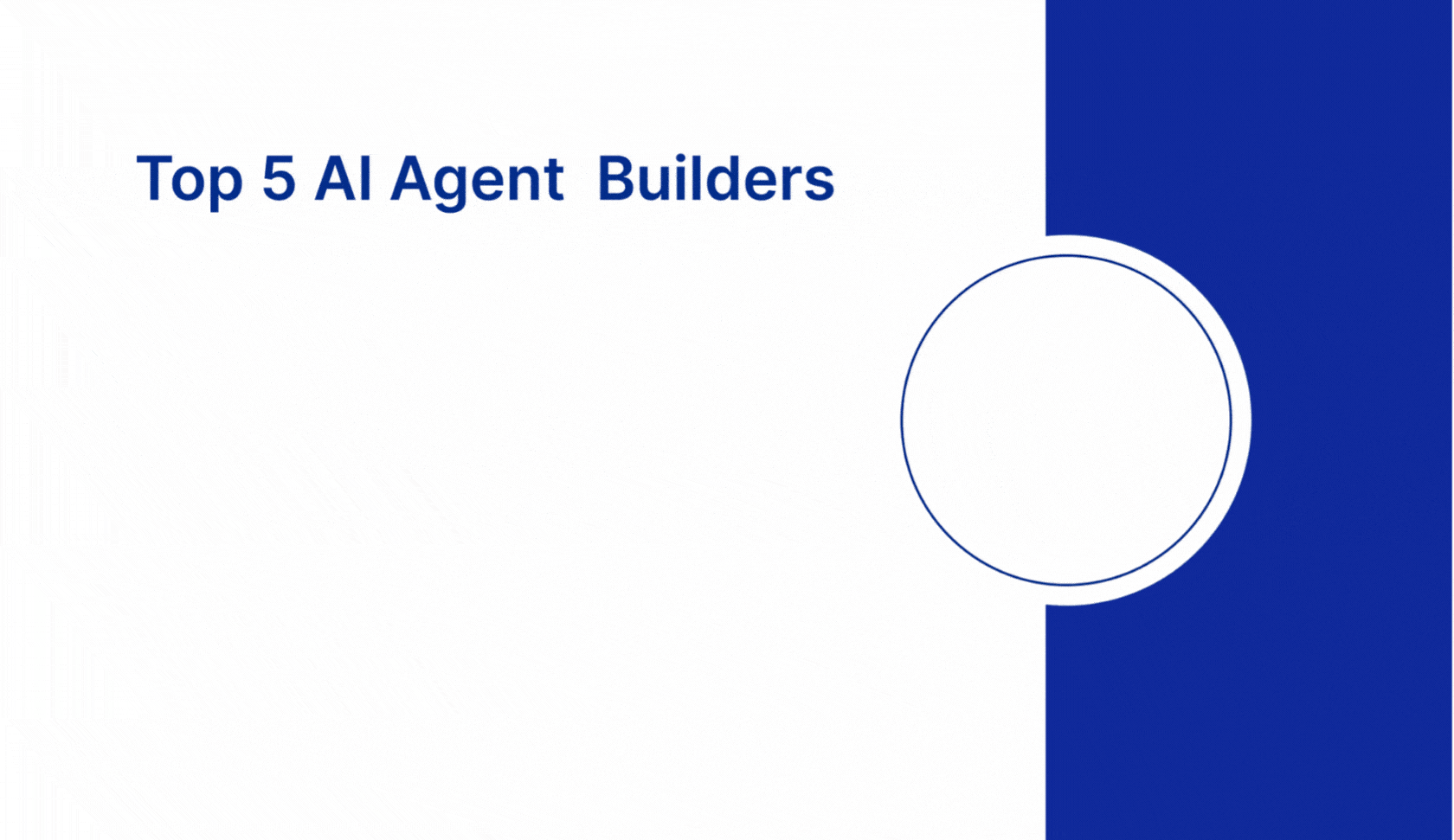Top AI Agents
BLOG
Quick Summary
Today AI agents are being increasingly used to get optimise workflows in almost every industry. With the functionality of planning, acting, learning on the go these agents are creating new ways for enterprises to drive efficiency. They can do things like provide personalized assistance, data-driven insights, streamline onboarding, optimize IT system performance and more. In this article we walk you through all things about Too AI agents and factors you need to consider before selecting your new AI Agent builder and find what the most successful companies do to get the most out of them.
Today AI agents have taken up the role of strategic executors. Moving beyond just another automation tool they are now smart coworkers who can plan, think, and act to meet enterprise needs in real time. They are responsible for getting things done end-to-end like processing insurance claims, fixing IT tickets, rebalancing supply chains validating healthcare authorizations, syncing product inventory across systems, and even drafting and refining legal documents.
In this article we will go into the details to find the best AI agent builder that will change how you handle workflows in 2025. But more importantly, it will guide you what truly matters when choosing one: most impressive interface or the biggest brand name, or the agent's ability to add value to real business operations.
What are AI Agents?
AI agents are autonomous software programs that perform tasks, make independent decisions, and learn and adapt—all in real time. Their ability to initiate actions with minimal human intervention makes them highly valuable and dynamic for evolving enterprise needs.
How AI agents work?
AI agents use a mix of advanced algorithms, machine learning methods, and ways to make decisions. These are the three things that all intelligent agents have in common:
1. Algorithms and architecture:
AI agents are made up of complicated systems that let them handle a lot of information and make smart choices. Machine learning helps these agents learn from their mistakes and get better over time.
2. Processes and workflows:
Most of the time, an AI agent's workflow starts with a task or goal. Then it makes a plan, carries out the steps it needs to, and changes based on what people say. This process makes sure that AI agents are always getting better at what they do.
3. Actions that are done on their own:
AI agents can do things on their own, which makes them great for automating tasks that need to be done over and over in software development, like code reviews or finding security holes.
How to Evaluate AI Agents? Criteria to Select the Best AI Agent

With so many AI agents flooding the market, it’s easy to get distracted by flashy demos or big-brand promises. But when it comes to actually choosing the right one for your business, these are the things that matter:
1. Can it deal with the complexity of the real world?
Find agents that can do more than just follow orders. The best ones can handle workflows with multiple steps, switch contexts when necessary, and make changes on the fly. It's probably not ready for prime time if an agent can't handle a messy situation in real life.
2. Does it think for itself or just do what it's told?
Independence is important. Some agents still need a lot of help. People can understand what you want, come up with a plan, and get things done without having to talk to you a lot. You want the second one.
3. Does it work well with your tools?
Your current systems, like Salesforce, SAP, Microsoft Teams, Slack, and APIs, should be easy for a good AI agent to connect to. It gets more useful the more connected it is.
4. Can it remember what happened the last time?
Keeping track of context is important. Good agents don't have to start over every time; they remember what their clients want, what their goals are, and what they're working on. That memory makes interactions smarter and smoother.
5. Is it safe, easy to find, and legal?
You should look for an agent platform that has the right access controls, audit trails, and monitoring tools, especially in regulated industries. If your team can't explain or keep an eye on what the agent is doing, that's a bad sign.
6. How simple is it to put together and keep up?
Some tools are made just for developers. Some are designed so that business users can create agents on their own using natural language or drag-and-drop interfaces. Make sure the platform is right for your team's skills and abilities.
List of Top 5 AI Agent Builders

AI agents have evolved from being pilots and proof-of-concepts to being an important part of how modern businesses work. But the biggest brand isn't the only thing that matters when choosing a platform. It's about who can give you the most value the fastest, the easiest deployment, and the most flexible features. Here are five platforms that are at the top of their game:
1. Accelirate AgentBuilder
Accelirate’s agentbuilder combines deep knowledge of enterprise automation with a focus on getting results from AI adoption. Their main program, the 5-Week AI Agent Activator Program, helps companies build and deploy production-ready agents in record time. The platform's main goal is to have an effect on business by lowering turnaround time, improving compliance, and lowering costs.
Their main goal is to make sure that humans, bots, and AI agents can work together in a way that is useful. Accelirate works with UiPath, Salesforce, Microsoft, and AWS, so teams can build smarter agents faster and scale automation without any problems.
They provide more than tools; they make things better, and big companies like Fortune 100 trust them.
Ideal for:
- Mid to large enterprises with complex, high-volume workflows
- Teams needing white-glove implementation and real ROI benchmarks
Why It Stands Out:
- Strong domain-specific expertise
- Integrates seamlessly with Salesforce, UiPath, and APIs
- Realistic implementation timelines—weeks, not quarters
2. UiPath Agent Builder
This tool uses UiPath's market-leading automation ecosystem to bring AI agents into the same world as RPA and test automation. This is a good fit if your team already uses UiPath Studio or Orchestrator.
You can use plain English to set performance limits, define how agents should act, and keep an eye on their work—all in the same governance layer you use for bots. You can make agents that get data, make choices, handle exceptions, and even start other automation.
Ideal for:
- Companies that put automation first and already use UiPath
- Industries that are regulated and need high auditability
Why It Stands Out:
- Human-in-the-loop help for workflows that need it
- Memory and context retention built in for tasks that take a long time
- Managing all bots and agents from one place
3. Salesforce's Agentforce
The main idea behind Agentforce is that AI agents should live where your business does: inside Salesforce. This low-code platform lets users create agents that can do things in sales, service, marketing, and even internal IT processes.
These agents don't just automate; they also personalize because they have direct access to Salesforce's Data Cloud. They use reasoning engines to figure out the best next steps based on contextual data, and they work in real time across channels.
Developers have full control with Flows, Apex, and MuleSoft APIs, while business users get ready-made templates.
Ideal for:
- Customer-facing teams in CRM, support, and commerce
- Companies that are already using the Salesforce ecosystem
Why It Stands Out:
- Made for business users—no need for a dev team
- Data Cloud has a lot of context awareness.
- Quick prototyping with Flows and builders that let you drag and drop
4. Microsoft Copilot Studio Agent Maker
Making AI agents with Microsoft's Copilot Studio is almost too easy. Users can create agents by simply typing in a prompt, or they can use guided configuration to set up triggers, logic, and integrations. These Copilot Agents work with Microsoft 365 to automate things like onboarding new employees, answering frequently asked questions, and more.
It connects to Microsoft Graph, SharePoint, Teams, and Outlook, and uses your internal knowledge to make agents that are very specific to your needs. This is a no-brainer if your company uses Microsoft first.
Ideal for:
- Support for HR, finance, IT, and internal operations
- Companies all used Microsoft 365.
Why It Stands Out:
- For Microsoft users, it's plug-and-play.
- Can be set up and tested right away in Teams or Outlook
- Natural language configuration makes it easier to learn.
5. Google Vertex AI Agent Maker
Google's Agent Builder is made to work on a large scale and be very advanced. It's not just about automating tasks; it's also about giving teams the tools they need to make modular, multi-agent systems with cutting-edge models like Gemini. Developers can create complex workflows that use many tools and data sources thanks to LangChain, LangGraph, and Google Cloud APIs.
The platform is flexible thanks to its Agent Development Kit (ADK), Agent Garden sample library, and Agent2Agent protocol, which lets you set up conversations between multiple agents.
Ideal for:
- AI research groups, cloud-native businesses, and enterprise dev teams
- Projects that need LLM fine-tuning or coordination between agents
Why It Stands Out:
- Made for developers and power users
- First-class help with choosing a model and making custom tools
- Native integration with Google's cloud stack and security system
Want to see these agents in action?
Request a live demoBest Practices and Strategies for AI Agent Implementation
It's not just about installing software when you roll out AI agents; it's also about laying the right groundwork. Here are some important steps you can keep in mind:
1. Start small and with a focused:
Pick one use case that is useful but happens over and over again, like routing support tickets, checking documents, or answering questions from within the company. Before you scale, make sure you do that.
2. Use the tools you already have:
The best agents don't work alone. To make them more useful and make them feel like a natural part of your workflow, connect them to your CRM, ERP, or analytics tools.
3. Get both the business and IT teams involved:
When technical teams build and business teams check, the best implementations happen. This makes sure that the agent is following company rules and solving real problems.
4. Don't measure activity:
Measure results. Don't just keep track of how many tasks an agent does. Also look at how much time they save, how accurate they are, and how happy their employees are. That's where the real worth is.
5. Be ready to change:
Agents are getting better at what they do very quickly. Things that work today might not work tomorrow. When you build your implementation, think about how it will change. Choose tools that are flexible, modular, and well-supported.
Ready to find the right AI Agent for your business?
Talk to our experts todayPick the Agent Builder That Works How You Work
AI agents are no longer just side projects; they are becoming a key part of how businesses work today. The best AI agents boost productivity by making things easier for employees, making customer service better, or freeing up time for more valuable work.
But to be successful, you don't have to follow the trend; you just have to find the right fit. Begin with small steps, stay practical, and grow with purpose.
The tools we've talked about so far Accelirate, UiPath, Salesforce, Microsoft, and Google are a great place to start if you're looking at agent platforms. They all point to the same future, where smart agents help us work better and not just help us get things done.


